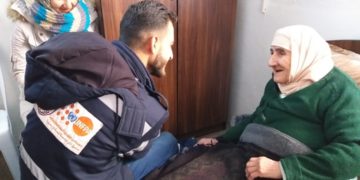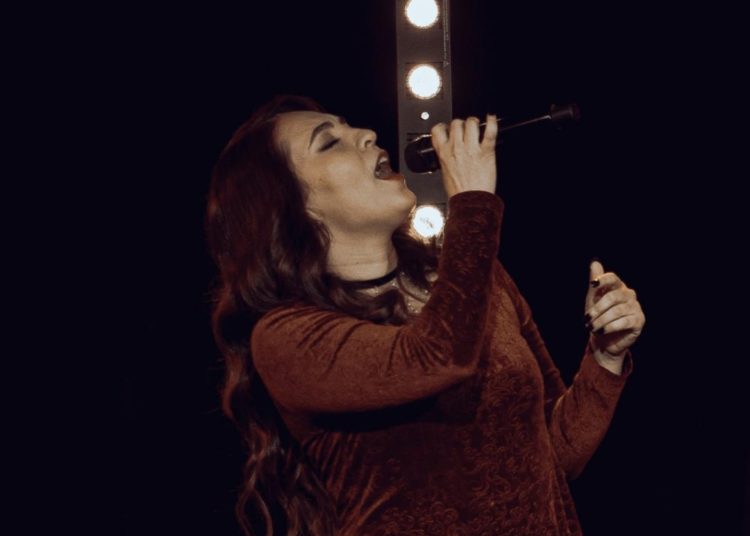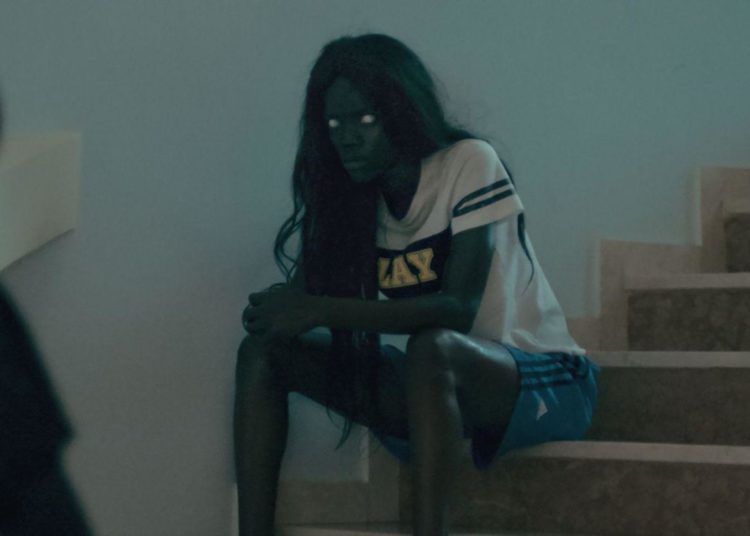This post is also available in: Français (French)
Women of different backgrounds and vocations find their destinies intertwined under the siege of Mubarak’s police. Their words, dreams, and hopes lead us to reflect deeply on the fate of a country which, now more than ever, is being suffocated by a ruthless and violent dictatorship. Those who bear the brunt of this are, above all, the journalists, human rights activists, and political dissidents who have filled up the country’s prisons, but also the ordinary citizens who risk being arrested for having dared to denounce the abuses they have suffered or the difficulties linked to the economic crisis.
The women of “Trapped” have very different backstories: some are activists who are personally involved in the demonstrations against the regime, while others are here almost by chance, though they also share the same demands as the other women. Coming from different social and cultural backgrounds, they all suffer from the limits imposed by a corrupt, reactionary, and patriarchal society. Each in her own way dreams of freedom, emancipation, rights, and dignity for herself and the Egyptian people.

The first story takes place in a small mobile phone shop in central Cairo where, shortly before closing time, a young woman enters and begs the owner to hide her from the police who are chasing her. After some initial hesitation for fear of being denounced by this stranger, the young woman hides in the back room until the first light of dawn. The second story unfurls in a historic building in the city: Neama is a nurse who is about to leave her daughter Farah alone at home to go to work, even though she knows that she won’t be able to get to the hospital easily because of the protests that have just broken out. She asks the little girl not to open the door for anyone and locks her inside the apartment. Mona, who is being pursued by the police, takes refuge in the corridor of their building. She is trapped in there because the gate has been chained shut by the police. She tries to get some tenants to open the gate for her but she only comes across the little Farah, with whom she has a long conversation through the peephole. The last episode is filmed inside a popular hammam, where police officers are asking the complacent owner to hold two protestors until the officers’ return. Salma is a determined activist and knows her rights, while Jihan, who has never participated in a protest before, seems hesitant and fearful. Imprisoned together within the walls of this charmingly decadent place, they start sharing stories and confiding in two other young women, an employee of the hammam and a loyal client.
The trailer for Trapped by director Manal Khaled, written by Rasha Azab (77’, Egypt, 2021). The film was never screened in Egypt but won major awards abroad at many international festivals, such as South by Southwest in the United States, the Amman International Film Festival, the El Gouna Film Festival, the Beirut Human Rights Film Festival, and the Cinema del Mediterrani festival in Spain.
The last scene of the film shows the four women around a hot water bath, and one of them asks, “Are we ever going back to the streets?” A simple but deeply symbolic question if thought of in conjunction with the current situation of the country, which is caught in the grip of a ruthless and corrupt regime that has squashed any ounce of hope in possible change.
“The revolution has been crushed: we can no longer take to the streets to express our discontent, but our political and social consciousness will never be destroyed: today, this consciousness involves many women who are fighting for common demands, as most men are now in prison,” explains Rasha Azab, who is a writer, journalist, human rights activist, and the screenwriter of the film Trapped. In fact, statistics in recent years indicate a significant increase in the number of female-headed households, partly due to a parallel rise in divorce and widowhood but mostly because of the imprisonment of many women’s husbands.

“Physical abuse, which is very common in Egypt, is now regularly denounced by people who are not involved in political struggles,” the writer continues. She herself has twice been sentenced to pay significant sums for having supported victims of sexual violence who chose to testify publicly. The most recent case concerns Islam al-Azzazi, a director who was accused of rape but who has not yet been convicted due to lack of evidence. “During my trial, the judge asked me why I had insulted this man. I said that I’d done it because he is a rapist who destroyed the lives of dozens of women. He then said to me: ‘It’s not because he’s raped that he should be insulted.’ The fact I’d insulted him publicly was almost more serious to them than the actual abuse he’d committed. This clearly explains the paradox and violence in our society,” Azab tells us. She ended up being acquitted of the charges of defamation and slander that were brought against her in April 2022.
More and more housewives are also denouncing the increase in prices, notably that of oil, which has tripled in six months. They are calling out the varying difficulties caused by the economic crisis. “I think it’s about power: right now, women are aware that they have a certain power, and they are using social media to speak out against injustices and to connect with others who are suffering from the same conditions,” she explains. “Many post videos because it’s the only means of communication since the regime shut down newspapers and now that television stations are in the hands of the army. Women are speaking out on social media as Sisi tries to contain this by throwing people in prison.”
According to the latest update from the “Till the Last Prisoner” campaign, there are currently more than 200 political prisoners in Egypt, but over the past seven years, the total number of female prisoners has increased in all the country’s prisons—and their conditions of detention are dramatic. In Damanhour and al-Qanater, it is common to undergo body searches, beatings, and psychological and verbal abuse, and to be deprived of objects and personal belongings. Female prisoners’ right to communicate with their relatives is often denied, as is their right to see their children. They do not have access to sanitary napkins nor to the medical treatments necessary if pregnant. They often are not even given cutlery to eat.
“The Egyptian regime is authoritarian and patriarchal,” writes Solafa Magdy, an expert on the status of women in the country’s prisons. “When arrested, women are dealt with on the basis that they have committed the crime of being interested in working in politics or public affairs, and that they must be punished for it.”
In this climate of deprivation and violence, the most humiliating treatment goes to female journalists, human rights activists, and political opponents. “The journalist Marwa Arafa has been in prison for three years in pre-trial detention, a measure that should only last a maximum of two years. Some colleagues have been arrested for criticizing what is happening with state television. Others are in prison despite their advanced age and serious health conditions. The regime is threatening to transfer many of these women to new prisons: 38 prisons have been built in recent years, mostly in isolated places that are difficult for their families to access,” Azab adds.
The living conditions of women in penitentiary establishments essentially depend on their social class, the activist emphasizes. “The poorest women cannot even pay the expenses incurred by the prison, and their families are not able to provide them with what they need to survive, so they are forced to work. Another very common form of abuse reserved for unmarried women: the virginity test, which is carried out in hospitals but also inside the prison. It’s humiliating in itself, truly a terrible form of abuse that comes along with other inspections that these women are continuously subjected to and that often result in harassment and indecent assault.”
Former detainees interviewed by the Tahrir Institute for Middle East Policy (TIMEP) have stated that during searches for allegedly prohibited items, their genitals had been intentionally touched and they had been stripped naked by male policemen and officers. Many female political prisoners are also placed in cells with dangerous criminals or are forced into total solitary confinement—risk of abuse increases in these cases because the women are deprived of the support and protection of the other female prisoners.
“The Egyptian regime is authoritarian and patriarchal,” writes Solafa Magdy, an expert on the status of women in the country’s prisons. “When arrested, women are dealt with on the basis that they have committed the crime of being interested in working in politics or public affairs, and that they must be punished for it.”































